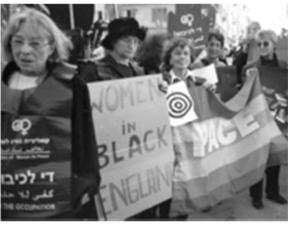Israel: Security -- For Whom?
 “The term security is a concept that organizes the perception of reality in Israeli society...drawing its power from the existential fears of the Jewish people and reinforcing the conviction that the greatest threat is an external attack.”
“The term security is a concept that organizes the perception of reality in Israeli society...drawing its power from the existential fears of the Jewish people and reinforcing the conviction that the greatest threat is an external attack.”
This opens a 2006 report from the web page of The Coalition of Women for Peace, a group comprised of Arab and Jewish citizens of Israel.
Ironically, the report finds that this mindset actually makes Israel less secure because it exacerbates the Israeli/Palestinian conflict by fostering the militarization of Israeli society, thereby creating a ruling class with a stake in perpetual war. Some of the report’s findings are:
- Retired military men are over-represented in all levels of Israeli political leadership, while a great many educational leaders are also retired army officers, generating a culture biased towards patriarchal and military values.
- In 2004, 27% of the state budget went to “security.”
- Approximately half of all land within Israel proper is set aside for military use.
Civil society and social justice pay the price. for example, just since the second Palestinian uprising [intifada] in September 2000:
- The economic situation of approximately 40% of Israeli women has worsened.
- There has been a 57% increase in requests for protection orders to prevent domestic violence.
- There has been a 203% increase in cases involving wife-beatings between 1999 and 2003.
- Arab citizens of Israel have received 5% of the state budget or less, even though they comprise 19% of the population.
- Approximately 80% of Arab women citizens have remained unemployed even though half would like to enter the labor market.
- More than 75,000 Arab citizens living in the Negev are without water, electricity, and educational and health institutions. Their homes are currently threatened with demolition.
The result is a very different sort of insecurity stemming from acute internal problems of poverty, unemployment, crime, environmental hazards, and economic, gender and racial inequality. The report concludes that this fosters an endless cycle of violence, “producing and disseminating the fear, and blurring the fact that war is actually a political decision of policy-makers, not an ineluctable reality forced on us from the outside.”